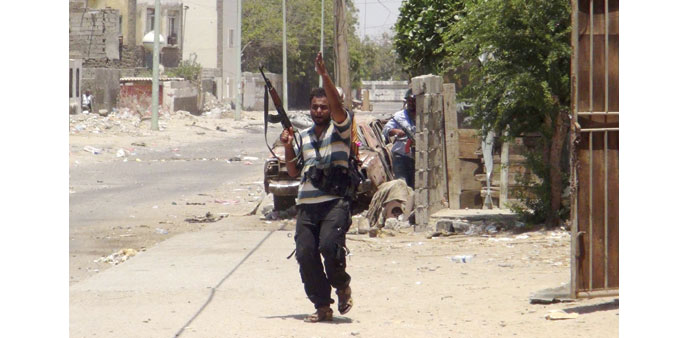Agencies
Aden
The Yemeni commander of a vast military district covering half the country’s border with Saudi Arabia pledged support yesterday to exiled President Abd-Rabbu Mansour Hadi, local officials said.
The announcement puts at least 15,000 troops in the desert and mountain border area on the same side as Saudi Arabia, which backs Hadi and has waged an inconclusive three-week bombing campaign against Houthi rebels in Yemen who are allied with Iran.
“Brigadier General Abdulrahman al-Halily of the First Military District announced today his support for constitutional legitimacy as represented by President Hadi,” one of the officials said.
The declaration was also broadcast on official radio in the city of Seiyun, the main city of the Hadramout valley area where the district’s main military base is located.
Most of Yemen’s military is loyal to powerful ex-president Ali Abdullah Saleh, whose forces are fighting alongside the Shia Houthi militia in battles stretching across Yemen’s south and east.
But the defection of the northeastern troops brings to about 10 the number of divisions that back Hadi. It may point to an increasing sense in the military that momentum favours the president, who resides in exile in the Saudi capital Riyadh.
Beginning last week, most of the army divisions along Yemen’s eastern Arabian Sea coast evacuated their posts and handed security of their bases and Yemen’s Masila oilfields, the country’s largest, to armed Sunni tribes.
Other powerful tribes followed suit last Monday within the First Military District, announcing after a vast gathering that they supported Hadi and the Saudi-led military operation, in a move which likely encouraged the commander’s decision.
“The announcement followed that of the tribes. It would be impossible to oppose their will and continue to live side by side, and there was likely some pressure from Saudi Arabia, which is keen to secure its border,” Radhi Subaih, a political analyst in Seiyun, said.
Citizens from Hadramout, Yemen’s largest province which stretches from the coast to the Saudi border, are linked closely to the kingdom by family and historical ties.
The remainder of Saudi Arabia’s border with Yemen encompasses the northern stronghold of the Houthi guerrillas, who are avowedly hostile to Saudi Arabia.
Medics and military sources said yesterday clashes between rebels and pro-government forces and Saudi-led air strikes killed at least 85 people in Yemen.
The United Nations says hundreds of people have died and thousands of families have fled their homes since the coalition air war began on March 26.
Since Saturday, fighting has concentrated on four key southern cities, while Saudi-led warplanes also pounded Houthi rebel positions in the area.
The deadliest clashes took place in the city of Daleh, where 31 Houthis and 17 pro-Hadi forces were killed yesterday, a local official said, also reporting a series of air strikes on rebel positions.
Pre-dawn clashes in the southwestern city of Taez left 10 Houthi rebels and four pro-Hadi militiamen dead, medics and local sources said.
Taez, Yemen’s third largest city after the capital Sanaa and second city Aden in the south, has seen fierce clashes over the past week, after having been largely spared in fighting that has spread across several provinces.
Yesterday, coalition warplanes pounded Houthi positions in Taez. Seven more Houthis were killed in an attack by tribesmen in the southern province of Shabwa.
In Aden, 11 Houthis and five pro-Hadi fighters were killed on Saturday night and yesterday morning, military sources said.
The pro-Hadi fighters recaptured the Russian consulate and a Hadi residence from the Houthis, they added.
The rebels, who seized Sanaa unopposed in September, have since expanded their control across the impoverished country.
Riyadh has pledged to fund a UN aid appeal.
Saudi King Salman ordered the aid pledge following the UN appeal on Friday for $274mn in emergency assistance for the millions affected by Yemen’s multi-sided conflict.
UN Humanitarian Co-ordinator Johannes Van Der Klaauw had said that “ordinary families are struggling to access healthcare, water, food and fuel—basic requirements for their survival”.

A fighter loyal to President Abd-Rabbu Mansour Hadi gestures during clashes with Houthi fighters outside Hadi’s house in Aden yesterday.
